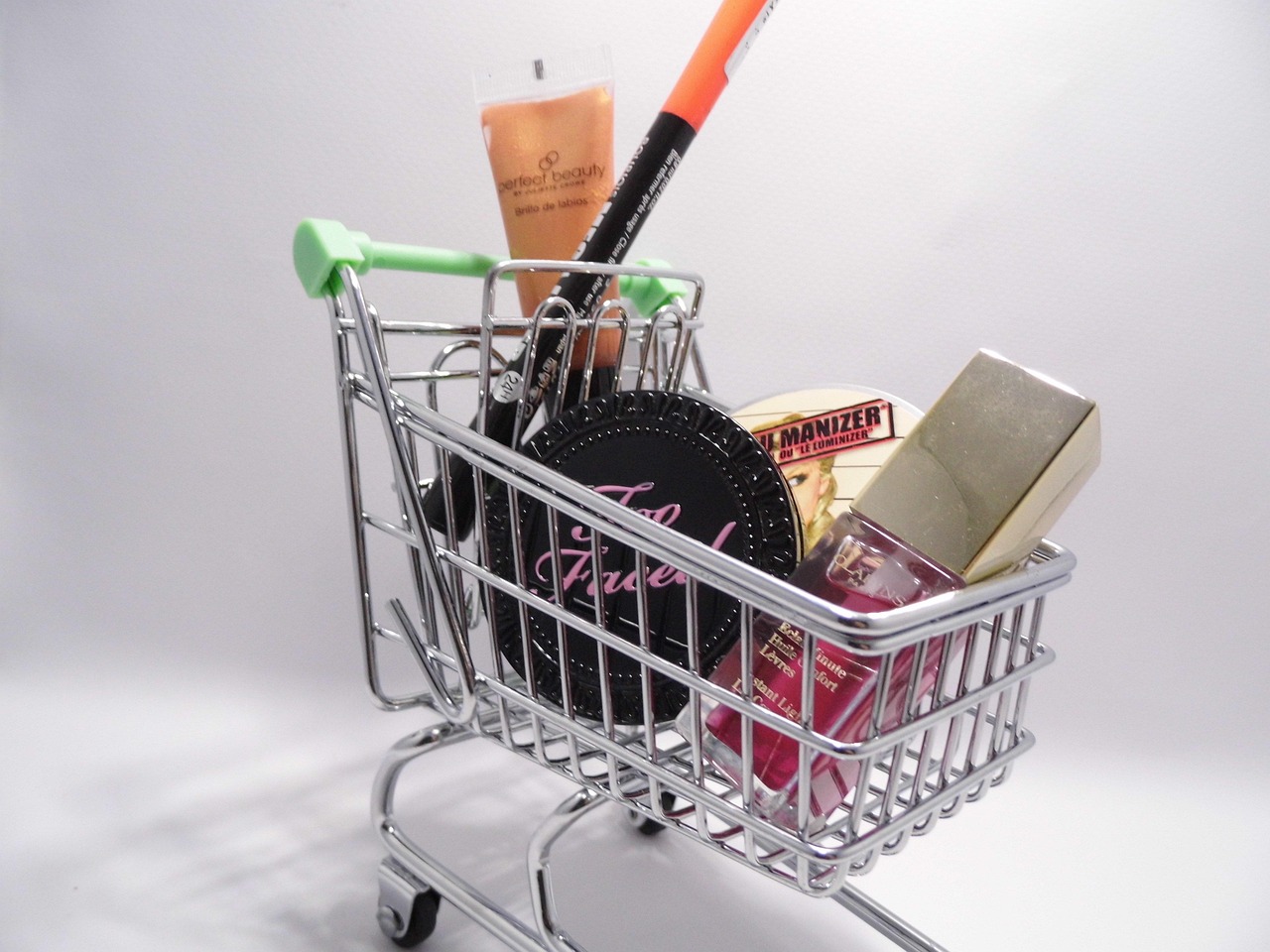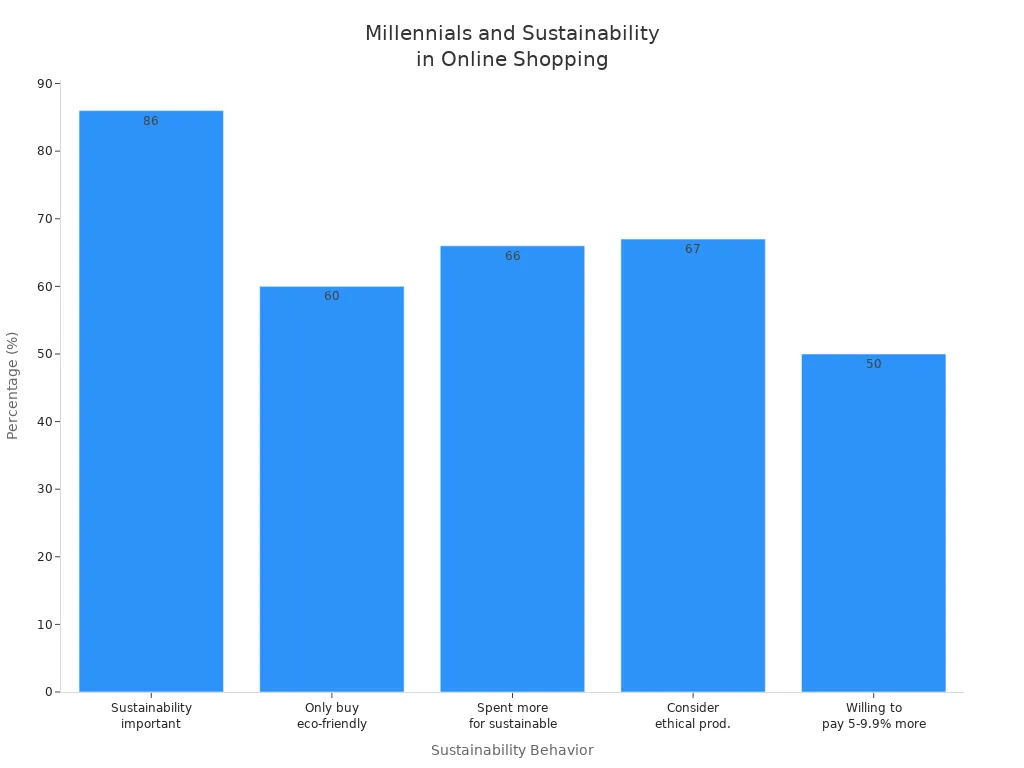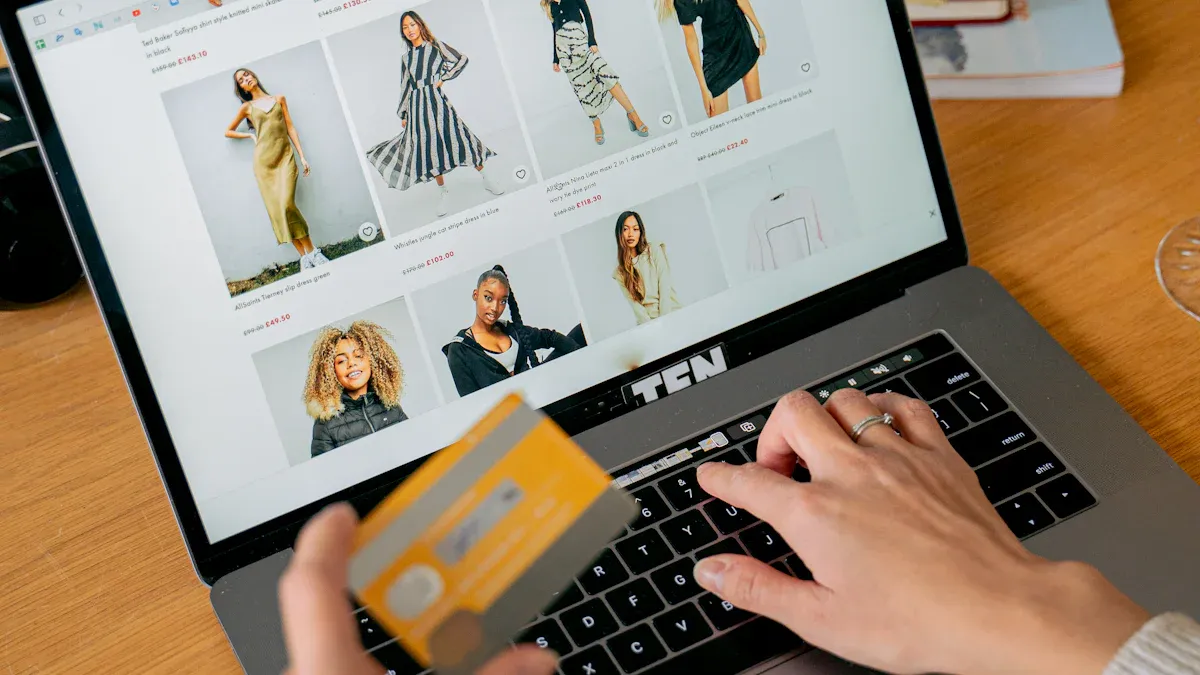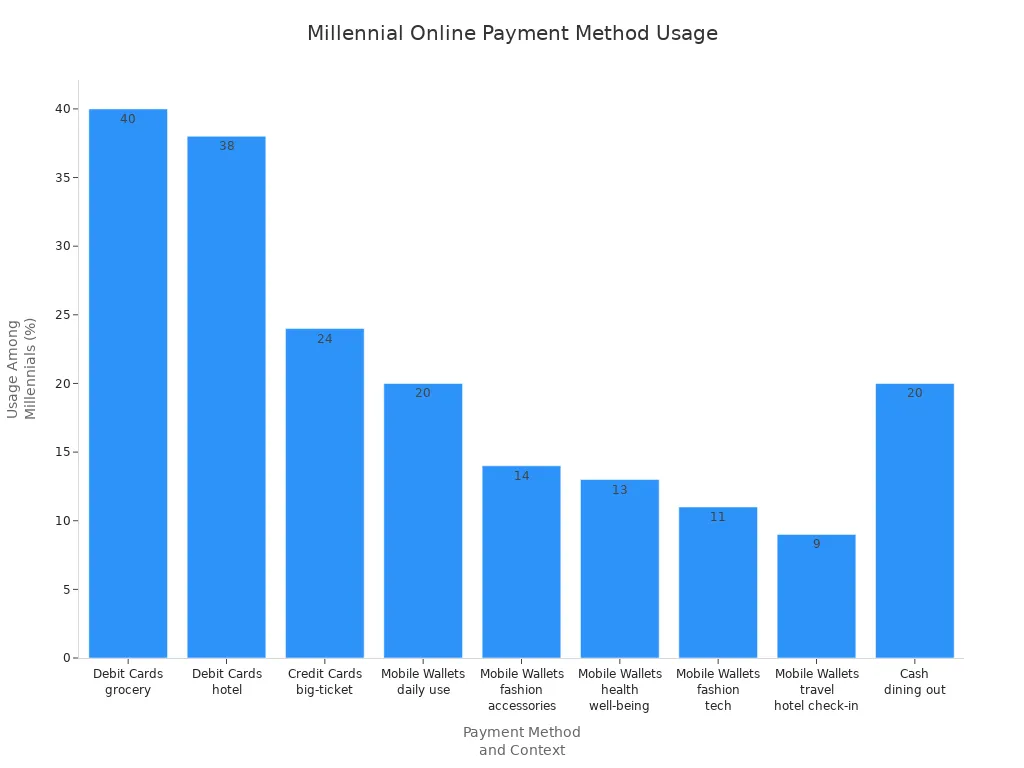Millennials Buying: Online Shopping Insights in 2025

A significant 67% of millennials now prefer shopping online rather than visiting physical shops. This shift prompts an important question: what drives millennials buying habits online? Many believe that convenience and speed are the key factors. For instance, millennials frequently buy items online whilst engaging in other activities on the internet. In fact, 76% shop whilst doing something else online. They also rely on e-commerce platforms such as Amazon to discover new products. Social media influencers play a crucial role in guiding their purchasing decisions. Understanding these trends enables brands to create a better online shopping experience tailored to millennials.
Key Takeaways
Millennials like shopping online that is quick and simple. They want it to feel made just for them and their style. Social media and influencers help millennials decide what to buy. This makes social commerce very important for shopping. Many millennials care a lot about sustainability. They pick eco-friendly brands and pay extra for green products. Most millennials use mobile devices to shop online. So, websites and apps must work well on phones. Flexible and safe ways to pay, like Buy Now Pay Later and digital wallets, make millennials return. Technology like AI, voice assistants, and augmented reality helps millennials shop faster and smarter. It also makes shopping more fun for them. Millennials think quality, brand trust, and good ethics matter more than low prices. Brands that mix personalisation, social commerce, sustainability, and easy mobile shopping will get and keep millennial shoppers.
Millennials Buying Trends
Millennials in 2025 like shopping online more than in shops. They want things to be fast and easy. They also want to feel good about what they buy. These habits change how brands sell things online.
Personalisation
Personalisation is very important to millennials. They want brands to know what they like. They expect special offers and choices made just for them.
AI Recommendations
Artificial intelligence helps online shops suggest things people might like. In 2025, 65% of millennials say AI makes shopping easier. AI helps them find new things quickly. AWISEE found that 58% of millennials buy more from brands that personalise shopping. This means they like it when shops make things feel special for them.
Custom Experiences
Millennials want more than just product ideas. They like getting special emails and offers. Loyalty rewards are important too. Brands that use data to make these experiences connect better with shoppers. Millennials go back to shops that remember what they like. They want to feel important and noticed.
Social Commerce
Social commerce is now a big part of how millennials shop. They spend lots of time on social media. Many buy things right from these apps.
Social Platforms
Shopping on social media is simple and fun. Millennials use Facebook, Instagram, and TikTok to find and buy things. The table below shows how social commerce affects millennials:
Aspect | Statistic / Insight |
|---|---|
Millennials' share of social commerce | Millennials make up 33% of global social commerce spending. They are the biggest group. |
Preferred shopping platform | 53% of millennials like Facebook best for shopping. Gen Z likes TikTok more. |
Top platforms for product discovery | YouTube (63%), Instagram (53%), TikTok (47%) are top for finding products. |
Trust in influencer marketing | One-third of millennials trust influencer advice, especially from real creators. |
Motivators for Millennial social shoppers | Deals, discounts, and easy buying on social media matter most. |
Social commerce platform features | Shopping is built into social apps. AI and influencers help personalise it. |
Role of user-generated content | User reviews and posts help millennials trust and choose products. |
Market projection | Social commerce will be over 17% of all online sales by 2025. |
U.S. social commerce sales forecast | $85.58 billion in 2025, thanks to Facebook Marketplace, Instagram Checkout, and TikTok Shop. |
Facebook social shoppers in U.S. | 80 million people in the U.S. will shop on Facebook by 2025. |
Influencer Impact
Influencers are important for millennial shoppers. Many trust what influencers say, especially if they seem honest. About one-third of millennials trust influencer tips completely. Reviews and unboxing videos from other shoppers help too. Deals and discounts from influencers make millennials want to try new things.
Sustainability
Sustainability matters a lot to millennials. They want to buy from brands that care about the earth and people.
Eco Choices
Most millennials look for eco-friendly options when shopping online. A survey says 86% think sustainability is important when picking products or shops. Half are happy to pay a bit more for sustainable items. Nearly 60% only buy from eco-friendly brands. Two-thirds have spent extra money on products with green packaging.

Ethical Brands
Millennials care about how things are made. About 67% check if products are made fairly before buying. They want brands to be open about their values. Millennials support companies that treat workers well and use good materials. Brands that care about ethics and the planet stand out online.
Tip: Brands that use personalisation, social commerce, and care about sustainability will keep millennial shoppers in 2025. These trends change online shopping and set new rules for the future.
Millennial Online Shopping Habits

Millennial shopping in 2025 shows big changes in e-commerce. Millennials are leading digital buying. They help set new trends for brands and shops.
Frequency
Weekly Shopping
Many millennials shop online every week. The GoDaddy Consumer Pulse survey in 2025 says 27% buy things online weekly. They often pick in-store or curbside pickup. This makes shopping easier for them. Shopping fits into their busy lives. Millennials like convenience. They often shop while doing other things.
Product Range
Millennials buy many types of products online. They buy lots of beauty items, clothes, and electronics. They also buy groceries and home goods more than others. Family life and city living make them shop for groceries online. E-commerce is now a big part of their daily routine. This wide range of products shows how their spending has changed e-commerce.
Device Use
Mobile Shopping
Phones and tablets are the main way millennials shop. They use many devices each day, but mobile is most popular. About 28% like shopping on smartphones more than computers. Men are even more likely to buy everything on their phones. The table below shows how common mobile shopping is:
Statistic Description | Percentage |
|---|---|
Millennials who shop on their phones every day | 63% |
Millennials comfortable making purchases on mobile | 65% |
Millennials using smartphones for shopping in stores | 84% |
Shops focus on mobile-friendly websites. Millennials want fast and smooth shopping.
Voice Assistants
Millennials love things that save time. Many use voice assistants for online shopping. About 15% of adults buy things with voice assistants. Over half use them to look up products. Millennials stand out because they want things to be easy. Voice assistants help them order groceries or check prices quickly.
Payment Choices
BNPL
Buy Now, Pay Later (BNPL) is popular with millennials. In the United States, 56% have used BNPL. This is more than any other age group. BNPL helps them manage spending and split payments for groceries, electronics, and more.
Digital Wallets
Digital wallets and mobile payments are growing fast. Millennials use debit cards for groceries and hotels. Mobile wallets like Apple Pay are becoming more popular. The chart below shows how millennials pay for things online:

Millennials care about safety and speed. They want quick and safe payments when shopping online. Shops that offer flexible payment choices keep millennials coming back.
Note: Millennial shopping habits show they want convenience, choice, and safe payments. E-commerce brands that know this can serve millennials better.

Online Shopping Experience
Millennials in 2025 want online shopping to be easy. They expect to find what they need fast. They want their orders to arrive quickly. Checking out should not be hard or confusing. Brands that do these things well get more shoppers. People come back to shops that make things simple.
Seamless Navigation
Easy navigation is important for online shopping. Millennials want to move between pages without getting lost. They like websites that work on computers and phones. They want the website to look the same everywhere. This is called an omnichannel strategy. It helps shoppers feel sure about where they are.
Mobile-first design is very important. Millennials shop on their phones a lot. Brands need to make sure their sites load fast on small screens. Simple designs and clear menus help a lot. Fast loading times matter too. Shoppers do not like pop-ups or messy pages. When it is easy to find things, people enjoy shopping more. They are also more likely to buy something.
Tip: A smooth shopping experience keeps Millennials interested. It makes them want to shop again.
Fast Delivery
Getting orders fast is very important to Millennials. They want their things to arrive on time. Most want same-day delivery if possible. If delivery is slow, some leave their shopping carts. About 18% of Millennials do this when delivery takes too long.
Millennials want to see all costs before they pay. They like it when delivery fees are included in the price. This makes them feel better about buying. It stops surprises at the end. Shopping online is popular because it is quick and easy.
Checkout Simplicity
A simple checkout makes shopping better. Millennials want to finish buying things quickly and safely. They like having many ways to pay. These include credit cards, PayPal, Apple Pay, Google Pay, and Buy Now Pay Later. This means everyone can pick what works for them.
Clear details about shipping, returns, and costs help build trust. Shoppers do not like hidden fees or confusing pages. Brands that show all the details and give sign-up rewards get more sales. Showing security at checkout helps people feel safe.
Key points for easy checkout:
Show all costs before paying.
Give lots of payment choices.
Explain delivery and returns clearly.
Make signing up easy or give a reward.
Millennials want things to be easy and clear. Brands that do this well make shoppers happy and keep them coming back.
Millennials and Technology

Millennials in 2025 really like new technology. They want shopping to be smart and simple. Many brands use new technology to help them shop. AI, voice assistants, and augmented reality change how Millennials buy things.
AI Integration
AI is used a lot in online shopping now. It helps shops know what people want to buy. Two-thirds of Millennials want content and product ideas made by AI. They think AI makes shopping quicker and more fun. A Capgemini report says most Millennials feel AI makes shopping better. AI saves time and gives choices that match their style. Many say AI helps them find things they did not expect. Shops use AI to send special offers and reminders. This makes Millennials feel noticed and important.
AI in shopping is smart and personal. Millennials like when technology helps them find new products and deals.
Voice Commerce
Voice assistants are popular with Millennials. Many use them every week to shop or search for things. Here are some facts about voice commerce:
43% use voice search to look up products.
Millennials are quick to try voice tech because it is easy.
Voice commerce changes how people buy things. Millennials can ask their device to order food or check prices. This makes shopping fast and hands-free. But trust in voice assistants has gone down. Confidence dropped from 73% to 60% in just over a year. Some worry about mistakes or privacy. Still, many use voice tech for simple jobs.
Augmented Reality
Augmented reality, or AR, is another trend Millennials like. AR lets them see products in their own home before buying. This makes shopping more fun and less risky. Here is how AR helps Millennials:
It gives clear information about products.
It helps people pick the right item and return less.
AR features make shoppers feel sure and loyal.
Brands like IKEA and Sephora use AR so shoppers can try before they buy. Millennials enjoy the fun side of AR. It makes shopping feel like a game. AR also helps them share their shopping on social media, which helps brands get noticed. When AR works well, Millennials are happier with their online shopping.
Tip: Brands that use smart technology like AI, voice assistants, and AR stand out to Millennials. These tools make shopping easier, quicker, and more fun.
Values in Millennials Buying
Quality Focus
Millennials really care about quality when they shop online. They want things that last and work well. They do not just want the cheapest price. Discounts and deals get their attention, but quality matters more. Brand reputation is also important to them. Many use new technology like AI to check if products are good. This helps them avoid sending things back. It also makes them feel happy with what they buy. For millennials, quality is not just about how something works. It also means caring about people and the planet. About one in four millennials think about how brands treat others and the earth before buying. Around 40% look for brands that help the environment. They like to find coupons, but they will not pick poor quality just to save money. This shows millennials want smart and meaningful shopping.
Millennials care about:
Strong product quality
Good brand reputation
Ethical and eco-friendly actions
Social Impact
Social and ethical values are very important to millennials. They want brands to stand for something good. Many look for companies that support causes and use fair materials. They also want brands to treat workers well. Millennials often choose brands that share their beliefs. They like to see real stories and honest actions from brands. Over 70% will pay more for brands that help the world. They also care about social validation. Reviews and user stories matter more than adverts. Millennials want to feel part of a group. They often share their own shopping stories online. For many, shopping is not just about things. It is about helping others and making a difference.
Note: Millennials often pick experiences over things. What a brand stands for can be more important than the product.
Brand Trust
Trust is very important for millennials when they shop online. They want to know brands will do the right thing. Many trust influencers and real customer reviews more than adverts. Most people need to trust a brand before they buy. Millennials often check how brands handle data and privacy. If a brand is not honest, they will shop somewhere else. Some stop buying from brands with bad business actions. Brands that are open, act fairly, and help good causes get loyal shoppers. Millennials use social media and friends’ opinions to choose where to shop. They want brands to be clear, honest, and keep their promises.
Ways brands earn trust from millennials:
Give clear and honest information
Support social and environmental causes
Share real customer stories and reviews
Millennials want brands to match their values and give good experiences. When brands do this, they earn trust and keep shoppers coming back.
Data and Insights
Demographics
Millennials are about 30% of all online shoppers. They were born between 1981 and 1996. This group is now the biggest in the workforce. Many live in cities and have busy days. Most use technology every day. Phones and apps help them with work, family, and shopping. Millennials like to buy things quickly and easily. They are leaders in online grocery shopping. In the last month, 75.6% bought groceries online. This shows how much their habits change shopping.
Millennials use social media to find new products. They trust reviews from other shoppers. Many share their own shopping stories online. This helps brands know what matters to them. Millennials want brands to care about people and the planet. They look for companies that share their values. These trends show why brands must notice millennial spending habits.
Spending Patterns
Millennials spend more than many other groups. In the U.S., they spend $1.127 trillion each year. They make up 28.3% of all retail spending. Each millennial spends about $31,256 a year. This is 6.16% more than the average shopper. Millennials spend 18.5% more than Baby Boomers. They spend 17.1% less than Generation X. They often pick experiences over things. Many spend money on travel, eating out, and events.
Here is a quick look at key spending trends among millennials:
Aspect | Statistic/Insight |
|---|---|
Total annual retail spending by Millennials in the U.S. | $1.127 trillion |
Millennials' share of all U.S. retail spending | 28.3% |
Average annual retail spending per Millennial | $31,256 |
Spending comparison with Baby Boomers | 18.5% more |
Spending comparison with Generation X | 17.1% less |
Online grocery shopping in last 30 days | 75.6% have shopped for groceries online |
Frequency of online shopping | 44% shop online daily or weekly |
Millennials are careful with their money. Many have high living costs and student loans. They check brands and prices before buying. They use apps to find deals and compare products. Millennials use online grocery subscriptions more than others. This saves them time and money. Their habits help shape the future of online grocery shopping.
Note: Millennials use technology for shopping more than anyone else. They want things to be easy and good value.
Growth Areas
Online grocery shopping is growing fast. Millennials are leading this change. Over three-quarters bought groceries online last month. This number keeps going up. Online grocery shopping changes how shops sell food and home items. Many people now want fast delivery and simple ordering.
Other growth areas are mobile shopping and subscriptions. Millennials use their phones for almost everything. They order groceries, clothes, and meals with just a few taps. Subscription boxes for groceries, snacks, and drinks are popular. These services give new products and save time.
Social media also helps shopping grow. Millennials find new brands and products on TikTok and Instagram. They follow trends and share their finds with friends. Brands that use social media well get more sales.
Millennials care about the environment. They want eco-friendly packaging and fair brands. This shapes the future of online grocery shopping. Companies that care about these things will get more loyal shoppers.
Tip: Brands should watch how millennials shop and spend. This helps them find new ways to grow in online grocery shopping and more.
Adapting to Millennial Online Shopping
Personalisation Strategies
E-commerce brands need to focus on personalisation for Millennials. They want shopping to feel special and just for them. Brands use AI to suggest products based on what people like. This makes shopping easier and more fun. Personalised messages work better than general ones. They help get more people to visit and buy. Millennials like things that save time. They want brands to remember what they have bought before. This helps brands show the right products.
The table below lists some top ways to personalise shopping:
Strategy | Description | Example / Statistic |
|---|---|---|
Transparency & Ethical Practices | Millennials want to know where products come from and how they are made. | Patagonia’s focus on sustainability attracts shoppers. |
Convenience & Personalisation | AI suggests products and streamlines checkout for a smoother experience. | |
Loyalty Programmes | Exclusive deals and rewards encourage repeat purchases. | Sephora’s points and birthday rewards build loyalty. |
Customer Reviews & UGC | Peer reviews and user content build trust and authenticity. | Contests and hashtags encourage sharing. |
Millennials often share their data for better shopping. Brands use this to send special offers and reminders. Emails about forgotten baskets and deals help keep shoppers coming back. When brands get personalisation right, Millennials trust them more. They also tell their friends about good experiences.
Tip: Personalisation helps brands earn trust and keeps shoppers coming back.
Social Commerce Tools
Social commerce has changed how Millennials shop online. They buy things straight from TikTok Shop, Instagram, Facebook Shops, and Pinterest. Brands work with creators and do livestreams to get attention. These tools make shopping quick and exciting.
Shoppable posts let people buy without leaving the app. This makes it easier and faster to shop. Augmented Reality lets shoppers try things on their phones. Live shopping events let people ask questions and see products in real time.
Best social commerce tools for Millennials:
Instagram shoppable posts for fast buying
TikTok Shop for new and popular items
Facebook Shops for safe shopping
AR try-ons for makeup and clothes
Live shopping with influencers
Brands make special content for each app and talk to their followers. They listen to feedback and answer questions. Exclusive deals and easy checkout make shopping better. Millennials want real stories, so influencer posts and user content are important.
Sustainability Initiatives
Sustainability is very important to Millennials who shop online. They look for brands that care about the planet. Most are happy to pay more for green products. They want to know where things come from and what they are made of. Brands should use packaging that can be recycled and eco-friendly materials.
Millennials do not like fake green claims. They want brands to be honest about what they do for the environment. Brands that offer recycling or trade-in options stand out. Working with green charities helps brands connect with shoppers. Shopping online should also be easy and quick for Millennials.
Note: E-commerce brands that focus on being green and fair get loyal Millennial shoppers.
Payment Flexibility
Payment flexibility is very important for Millennials who shop online. They want to choose how and when they pay. They also want to use any device they like. Many use mobile banking, digital wallets, and contactless payments. If a shop does not have their favourite payment method, almost half will leave their basket. This shows payment options are very important in online shopping.
Millennials want payments to be easy and safe. They look for secure checkouts and trusted payment logos. Shops that offer Apple Pay, Google Pay, PayPal, and Buy Now, Pay Later stand out. These choices give shoppers more control and make them feel special. When shops add flexible payments, they build trust and keep shoppers coming back.
Loyalty programmes are important too. Millennials like getting rewards and special offers right away. When shops link loyalty points with flexible payments, shoppers feel valued. This helps brands keep customers and stops them from leaving for other shops.
Here is a quick look at how payment flexibility affects Millennial shoppers:
Statistic | Insight |
|---|---|
29% of Millennials see flexible payment options as a big draw | Flexible payments attract more shoppers to e-commerce |
Nearly 50% will abandon a purchase if their payment choice is missing | Missing options can mean lost sales in e-commerce |
70% of all shoppers say payment choice matters most | Payment flexibility shapes where people shop online |
41% will never return after a false payment decline | Payment problems can hurt e-commerce loyalty |
Shops that offer lots of payment choices get more Millennial shoppers. They also keep them coming back for longer. Payment flexibility is not just a nice extra. It is now a key part of doing well in online shopping.
Mobile Optimisation
Mobile optimisation is now very important for online shopping. Millennials use their phones for almost everything, including shopping. They want websites to load fast and look good on small screens. If a site is slow or hard to use, they will leave and shop somewhere else.
Shops need to make sure their websites work well on all devices. This means clear menus, big buttons, and easy-to-read text. Mobile-first design helps shoppers find what they want quickly. It also makes checkout easier, which is important for busy Millennials.
Many Millennials shop while they are out and about. They might buy something on the bus, at work, or even in bed. Shops that make mobile shopping easy get more sales. Features like one-click checkout, saved payment details, and push notifications help keep shoppers interested.
Millennials also like using apps for shopping. Apps can give special deals, loyalty rewards, and faster shopping. Brands that make good mobile apps stand out from others. They make shopping feel personal and fun.
Tip: Shops should test their websites on different phones and tablets. This helps find problems before shoppers do.
Mobile optimisation is not just about how a site looks. It is about making shopping simple, fast, and fun for Millennials. Brands that do this well will see more repeat shoppers and higher sales.
Millennials change how people shop online in 2025. They look for personalisation, fast service, and ethical choices. Brands notice these trends and change quickly. Shoppers use mobiles, voice assistants, and social media all the time.
Key takeaways for brands and marketers:
Make shopping feel personal for each person
Give different ways to pay
Care about the planet
Next steps: Brands should check if their mobile sites work well, listen to what shoppers say, and tell true stories. Online shopping will keep getting better, with Millennials showing the way.
FAQ
What makes Millennials choose one online shop over another?
Millennials want shops that are easy to use. They like fast delivery and many ways to pay. They care about what brands believe in. Trust is important to them. Shops that make things feel special stand out. Eco-friendly choices also make a shop more popular.
How important is mobile shopping for Millennials?
Mobile shopping is very big for Millennials. Most use their phones to shop. They want websites that load quickly. Simple checkouts are important too. Brands with good mobile sites get more sales from Millennials.
Do Millennials really care about sustainability when shopping online?
Yes, they care a lot about sustainability. Many look for eco-friendly packaging. They check if brands help good causes. More than half will pay extra for green products. They want brands to do real things, not just talk.
Why do Millennials trust influencers and reviews?
Millennials trust stories from people like them. Influencers and reviews help them choose what to buy. They think these are more honest than adverts.
What payment methods do Millennials prefer online?
Millennials like having lots of ways to pay. Digital wallets and Buy Now Pay Later are popular. Contactless payments are used a lot too. If a shop does not have their favourite way, they might leave.
How often do Millennials shop online?
Many Millennials shop online every week. Some buy things every day. They like how quick and easy it is. Online shopping fits into their busy days.
What role does AI play in Millennial shopping?
AI helps shops show products Millennials might like. It sends special offers that match their style. Millennials think AI makes shopping faster and more personal.
Are Millennials loyal to brands?
Millennials stay loyal if brands meet their needs. Good service and quality products matter. Honest actions are important too. Loyalty rewards help keep them coming back.

TangBuy: A Smarter Way to Dropship in 2025
If you're looking to stay competitive with dropshipping in 2025, speed and trend-awareness are key. TangBuy helps you stay ahead with real-time product trends, fast fulfilment, and factory-direct sourcing. With over 1 million ready-to-ship items, 24-hour order processing, and seamless Shopify integration, TangBuy makes it easier to test, scale, and succeed in today's fast-moving eCommerce landscape.
See Also
Top Birthday Gifts To Sell Online Across All Categories
Effective Strategies To Attract More Shoppers To Your Store
Key Differences Between BigCommerce And Shopify For Success
Choosing Between Amazon And eBay For Your Online Venture
Discovering Your Ideal Audience For eCommerce Growth In 2025

